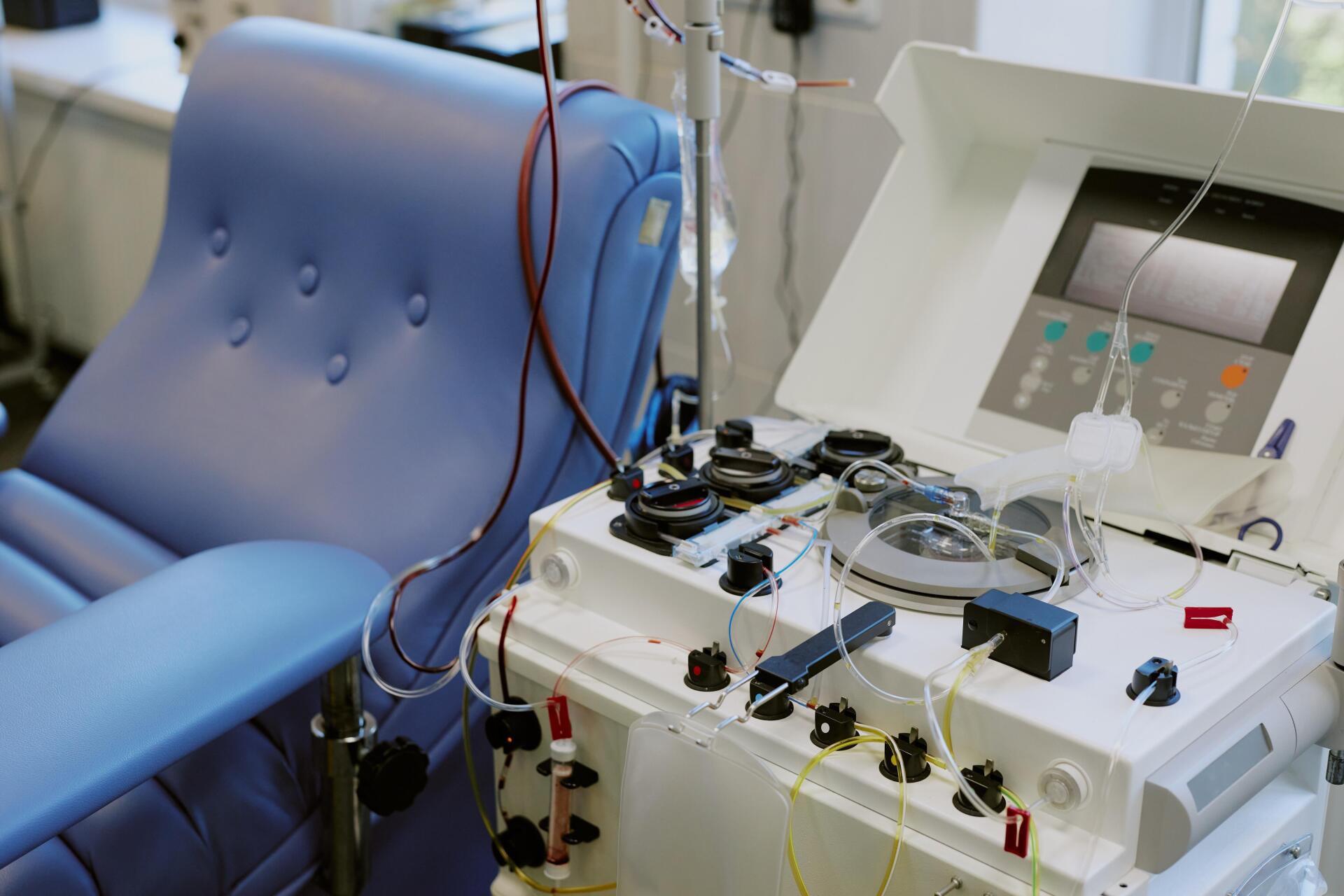
Dialysis
Depending on your kidney related health conditions, your nephrology doctor may suggest dialysis as the next step in your treatment. But what does dialysis involve? And what can you expect from this treatment? Here we will discuss the details.
What Is Dialysis?
The kidneys help to filter the blood of excess minerals, certain nutrients, waste products, and toxins. They also help with the regulation of blood pressure and blood pH, along with balancing sodium and water levels. So when kidneys are injured, damaged, or otherwise impaired, patients can quickly experience negative side effects leading to conditions like hypertension, glomerular disease, and both acute and chronic kidney disease, among other diagnoses. If renal function is compromised to the point that a patient’s health is at risk, they may need dialysis treatment to make up for the deficit in kidney filtration.
Also called kidney dialysis, the dialysis process helps to remove wastes and excess fluid from a patient’s bloodstream. Nephrology doctors can employ one of two common forms of dialysis to treat patients:
-
Hemodialysis: this is the most common type of dialysis and the process involves using a dialysis machine to divert blood from your body through vein in your arm, filtering it through a dialyzer to remove impurities, and then returning the cleaned blood to your body
-
Peritoneal dialysis: a semipermeable membrane found in the inner lining of your abdomen (peritoneum) along with a dialysate fluid are used to help blood vessels in the membrane to effectively filter your blood, depositing impurities into the dialysate fluid which is then drained away
Your nephrology doctors will best know which treatment will help your condition and fit in with your lifestyle and can advise you during your appointment.
Who Needs Dialysis?
Kidney function is vital to life, health, and wellbeing, and so anyone with a condition that includes seriously compromised kidney function may be a candidate for dialysis. After meeting in person and reviewing medical history and current treatments, your nephrology doctor can provide personalized medical advice and let you know whether dialysis is right for you.
In general, those who deal with late-stage kidney disease, end-stage kidney disease (ESKD) or kidney failure may require kidney dialysis to maintain health. This is a serious, life-altering but also life-sustaining treatment that is typically only used when other options are few or insufficient for patient needs. For those who cannot obtain a kidney transplant or are currently on a waiting list, dialysis is a way to maintain health.
In some cases, kidney damage is acute, due to illness or other unknown causes. Acute kidney failure can recover if properly managed. Such patients may also benefit from dialysis as they work toward recovering their health and kidney function.
What To Expect From Dialysis
Hemodialysis can be done at a dialysis center or at home, with timing and frequency varying by person and situation. That said, three times per week is the most common frequency across the board. Sessions often last for hours at a time as your body’s blood is completely filtered.
In preparation for hemodialysis, a surgeon will often join a patient’s artery and vein to form an arteriovenous (AV) fistula that enlarges blood vessels in the arm to make dialysis easier and blood flow faster. This is an outpatient procedure that takes some weeks or months to fully heal and mature to a point where it can withstand regular dialysis treatments.
For patients preparing for peritoneal dialysis, they may be prescribed either continuous ambulatory peritoneal dialysis (CAPD) or automated peritoneal dialysis (APD). The former uses a bag that slowly uses gravity to drain the dialysate, while the latter uses a machine to automatically add dialysate and later drain it. Preemptive surgery for peritoneal dialysis can include the insertion of a permanent catheter into the patient’s abdomen.
Patients treated using dialysis should generally expect less weakness and feelings of sickness that are caused from the buildup of wastes and toxins in the blood. They will also experience better balance of vital minerals and other key substances and fluids in the blood that aid in health and help to even out blood pressure. In general, a patient who undergoes regular dialysis should have an overall better sense of health and wellbeing.
Dialysis patients should be aware that there are some risks associated with treatment, as is true with any medical treatment. Discuss the risks and weigh the pros and cons with your nephrology doctors to ensure that you are fully aware of what is involved in your treatment. This will help you to prepare mentally, physically, and emotionally. Any negative reactions or sudden changes in health while undergoing treatment should immediately be reported to a healthcare provider.
In general, dialysis is not painful, though peritoneal dialysis can be uncomfortable for some. That said, the benefits typically far outweigh any associated inconveniences or discomfort. Patients can typically continue to live full lives while undergoing dialysis treatment, whatever their life situation, with only minor limitations on physical activities during the process itself.
Your Local Nephrologist in Akron, Ohio
At Northeast Ohio Nephrology Associates, we are here to help individuals dealing with chronic kidney conditions who are undergoing dialysis treatment. Our skilled nephrology doctors can help patients to develop personalized treatment plans, providing cutting-edge therapy options. At the same time, they can assist patients with practical needs as well, like lifestyle modification, education, and patient support. Contact us today to learn how you can become a patient and begin your journey to better kidney health!
Our Affiliates
Contact Us
(*) - Required field








